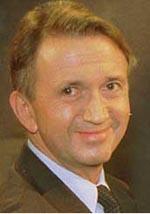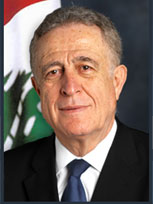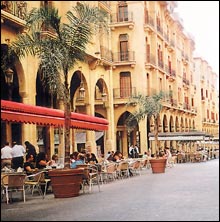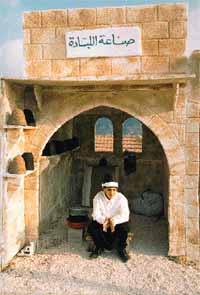 The United Nations has said it did not expect Lebanon to disarm Hizbollah fighters by force but hoped they would join the Lebanese army.Terje Roed-Larsen, the UN's Middle East envoy, speaking at a news conference on Sunday, said: "We don't believe that it is indeed possible to go down south or into the Bekaa Valley and take away the weapons of Hizbollah. "Our goal is to integrate Hizbollah into the Lebanese army."
The United Nations has said it did not expect Lebanon to disarm Hizbollah fighters by force but hoped they would join the Lebanese army.Terje Roed-Larsen, the UN's Middle East envoy, speaking at a news conference on Sunday, said: "We don't believe that it is indeed possible to go down south or into the Bekaa Valley and take away the weapons of Hizbollah. "Our goal is to integrate Hizbollah into the Lebanese army."
Roed-Larsen will present a report in April on progress in the implementation of the Security Council resolution 1559, which demands that foreign troops should leave Lebanon and militias there disarm.His comments came at the end of a 20-day tour that took the Norwegian diplomat around Arab capitals as well as to Paris, Washington, London, Moscow and Beijing to discuss Hizbollah's weapons and the armed Palestinian factions based in Lebanon.Hizbollah, whose attacks helped to end Israel's 22-year occupation of southern Lebanon in 2000, was the only Lebanese militia to retain its arms after the 1975-1990 civil war.
(Dr. Muhamad Mugraby: Press Conference, March 23, 2006, Liberty House, Beirut)
 The purpose of this gathering is to brief you on the case you read about in the news, i. e. my prosecution before the military court, Beirut, by reason of the testimony I gave on the conditions of human rights in Lebanon, at the European Parliament, Brussels, on November 4, 2003, i. e. two and a half years ago. Such briefing is particularly required because what I am involved in is not a private but a public matter related to the very essence of the state of knowledge, justice and freedom of expression. You may access the full text of the said testimony, without the questions and answers, from the internet on the following URL: www.combar.info/news/11042003.pdf.
The purpose of this gathering is to brief you on the case you read about in the news, i. e. my prosecution before the military court, Beirut, by reason of the testimony I gave on the conditions of human rights in Lebanon, at the European Parliament, Brussels, on November 4, 2003, i. e. two and a half years ago. Such briefing is particularly required because what I am involved in is not a private but a public matter related to the very essence of the state of knowledge, justice and freedom of expression. You may access the full text of the said testimony, without the questions and answers, from the internet on the following URL: www.combar.info/news/11042003.pdf.
Because this is a public matter, the European Union, which is bound to Lebanon by two international treaties that obligate all their parties to fully uphold and respect human rights, made several official objections to the Lebanese Government, including a letter on behalf of the European Parliament, copy of which is available here, and six international human rights organizations issued strong statements, copies of which are also available here. In addition, the Lebanese Society of Human rights issued a statement and member of the European Parliament, Paolo Casaca, issued two interrogatories to the European Commission and the European Council. Finally, the British MP, Mr. Julian Brazier, who is a friend of Lebanon, issued a statement which he has asked me to read to you with the following text:
 BEIRUT, 21 March (IRIN) - Beirut's impressive downtown district reflects much of the wealth and development that Lebanon has enjoyed since the end of the civil war in 1990. But a few minutes' drive to the capital's southern and northern fringes reveals a vastly different reality, featuring extreme poverty and underdevelopment. Residents and NGOs working to alleviate poverty put much of the blame for the shabby condition of the suburbs on government inaction. "We're second class citizens," said Youssef Hassan, a 48 year-old resident of the southern suburb of Hay al-Selom. "Officials forget we exist below the poverty line."
BEIRUT, 21 March (IRIN) - Beirut's impressive downtown district reflects much of the wealth and development that Lebanon has enjoyed since the end of the civil war in 1990. But a few minutes' drive to the capital's southern and northern fringes reveals a vastly different reality, featuring extreme poverty and underdevelopment. Residents and NGOs working to alleviate poverty put much of the blame for the shabby condition of the suburbs on government inaction. "We're second class citizens," said Youssef Hassan, a 48 year-old resident of the southern suburb of Hay al-Selom. "Officials forget we exist below the poverty line."
Khazen History


Historical Feature:
Churches and Monasteries of the Khazen family

St. Anthony of Padua Church in Ballouneh
Mar Abda Church in Bakaatit Kanaan
Saint Michael Church in Bkaatouta
Saint Therese Church in Qolayaat
Saint Simeon Stylites (مار سمعان العامودي) Church In Ajaltoun
Virgin Mary Church (سيدة المعونات) in Sheilé
Assumption of Mary Church in Ballouneh
1 - The sword of the Maronite Prince
2 - LES KHAZEN CONSULS DE FRANCE
3 - LES MARONITES & LES KHAZEN
4 - LES MAAN & LES KHAZEN
5 - ORIGINE DE LA FAMILLE
Population Movements to Keserwan - The Khazens and The Maans
ما جاء عن الثورة في المقاطعة الكسروانية
ثورة أهالي كسروان على المشايخ الخوازنة وأسبابها
Origins of the "Prince of Maronite" Title
Growing diversity: the Khazin sheiks and the clergy in the first decades of the 18th century
Historical Members:
Barbar Beik El Khazen [English]
Patriach Toubia Kaiss El Khazen(Biography & Life Part1 Part2) (Arabic)
Patriach Youssef Dargham El Khazen (Cont'd)
Cheikh Bishara Jafal El Khazen
Patriarch Youssef Raji El Khazen
The Martyrs Cheikh Philippe & Cheikh Farid El Khazen
Cheikh Nawfal El Khazen (Consul De France)
Cheikh Hossun El Khazen (Consul De France)
Cheikh Abou-Nawfal El Khazen (Consul De France)
Cheikh Francis Abee Nader & his son Yousef
Cheikh Abou-Kanso El Khazen (Consul De France)
Cheikh Abou Nader El Khazen
Cheikh Chafic El Khazen
Cheikh Keserwan El Khazen
Cheikh Serhal El Khazen [English]
Cheikh Rafiq El Khazen [English]
Cheikh Hanna El Khazen
Cheikha Arzi El Khazen
Marie El Khazen
 T
T